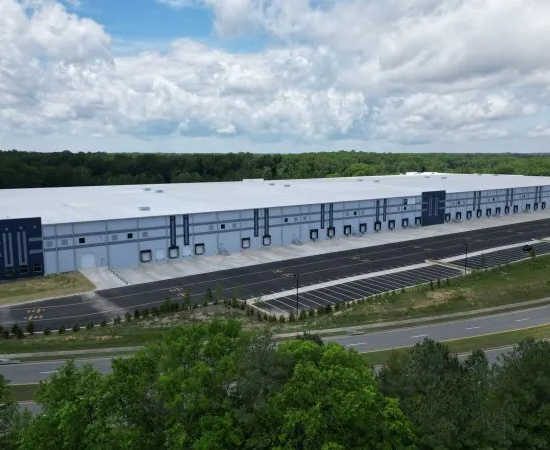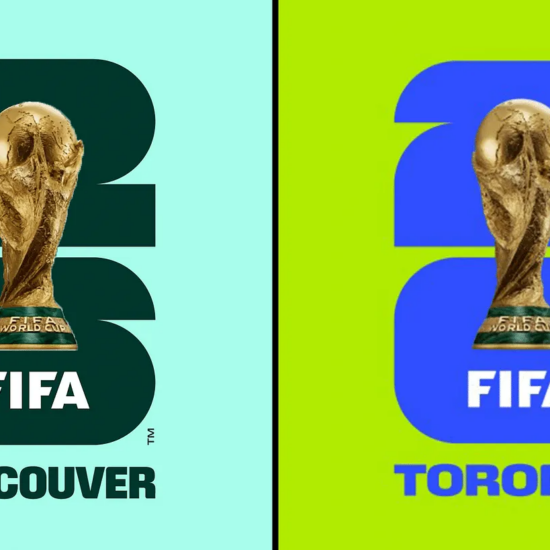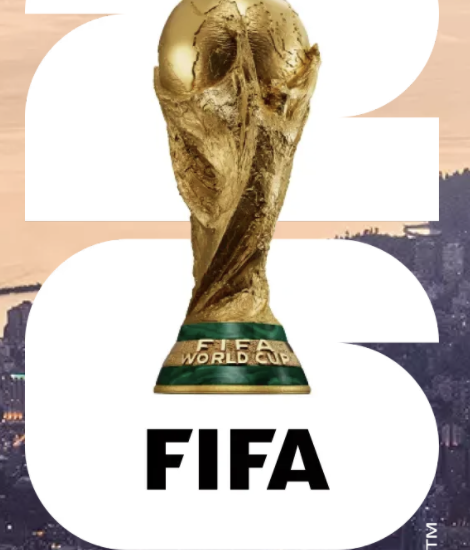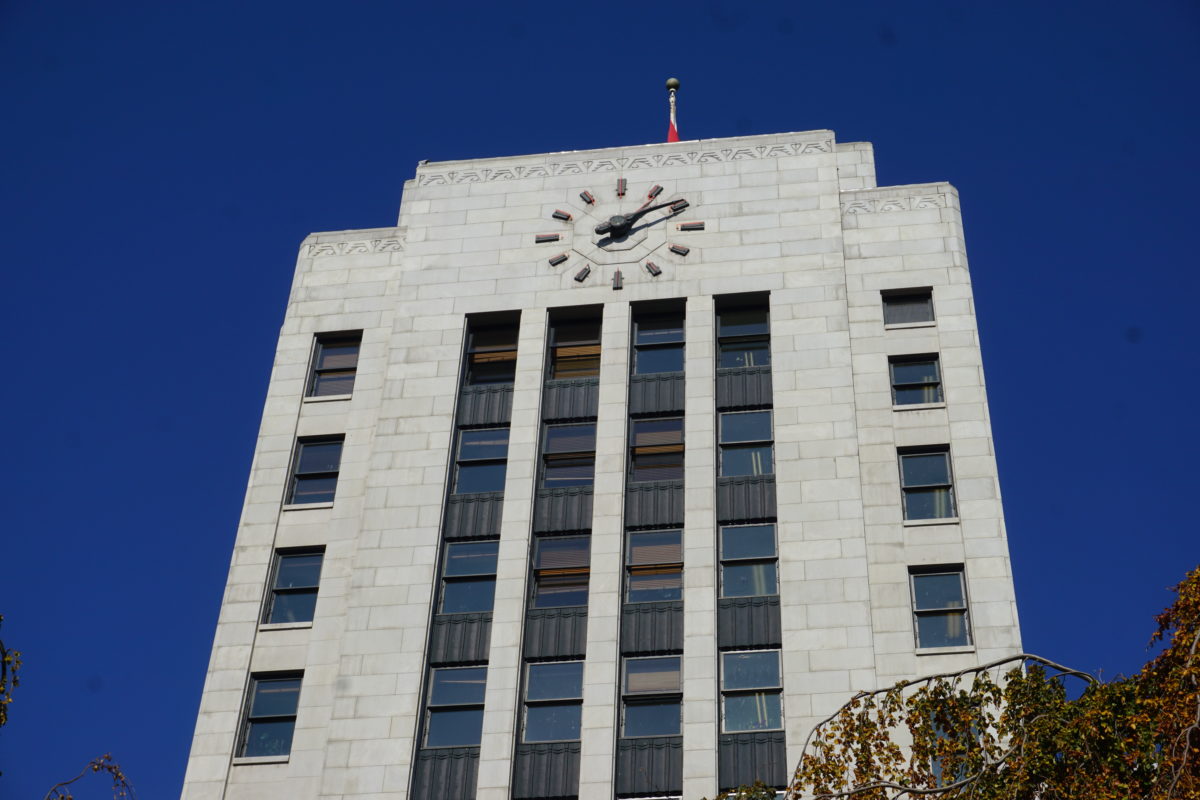
Bob Mackin
What next for Vision?
Or should the question be: is there a next for Vision?
Allan Wong is the last man standing. He won the last school board seat available on Oct. 20 with 47,378 votes — just 663 more than COPE’s Diana Day.
Heather Deal, the only incumbent Vision councillor, lost with 39,606 votes; she was re-elected in 2014 with 62,698. The Vision brand was too much to overcome. The task was that much harder after she drew a low position in the randomized ballot that fellow Visionista Andrea Reimer lobbied for.
A stayed domestic violence charge from 2010 forced mayoral candidate Ian Campbell out before he could register. On the eve of e-day, council hopeful Wei Qiao Zhang lost his endorsement over an unexplained misconduct.

Runner-up Ken Sim’s post-election speech Oct. 21 (Mackin)
The party that dominated Vancouver politics for almost a decade is now a tarnished brand. It proved the third-term is the hardest. The party did not regenerate after losing organizers and advisers to the Trudeau Liberals in 2015 and Horgan NDP in 2017. It also took about nine years for even Vision supporters to discover Robertson was an empty suit beholden to big money donors intent on transforming the city to an urban resort for China’s wealthiest.
The NPA losing streak is at four; could the solution to its mayoral defeats be among its newly elected five councillors?
NPA was the Non-Partisan Association, the grand old party that Gregor Robertson slammed in 2014 as a bunch of old, white guys. On Oct. 20, it elected five women, who are now the largest party bloc on city council: incumbent Coun. Melissa De Genova, ex-Park Board chair Sarah Kirby-Yung, ex-school board trustee Lisa Dominato, and newcomers Rebecca Bligh and Colleen Hardwick.
This is not your grandfather’s Non-Partisan Association. Welcome to the No-Phallus Alliance.
Hardwick, the daughter of late alderman and professor Walter Hardwick, mulled a run for the party’s mayoral nomination early this year. Will she do so again in three years, when October 2022 comes into focus?
The mercurial De Genova is bound to butt heads with councillors on the far left, COPE’s Jean Swanson and OneCity’s Christine Boyle. Expect Green Coun. Adriane Carr to play a moderating role. Her 69,885 votes were the most on the entire ballot in 2018 and she could make a viable run for mayor in 2022. She won’t be a one-woman band this time around, with support from newcomers Pete Fry and ex-park board chair Michael Wiebe.
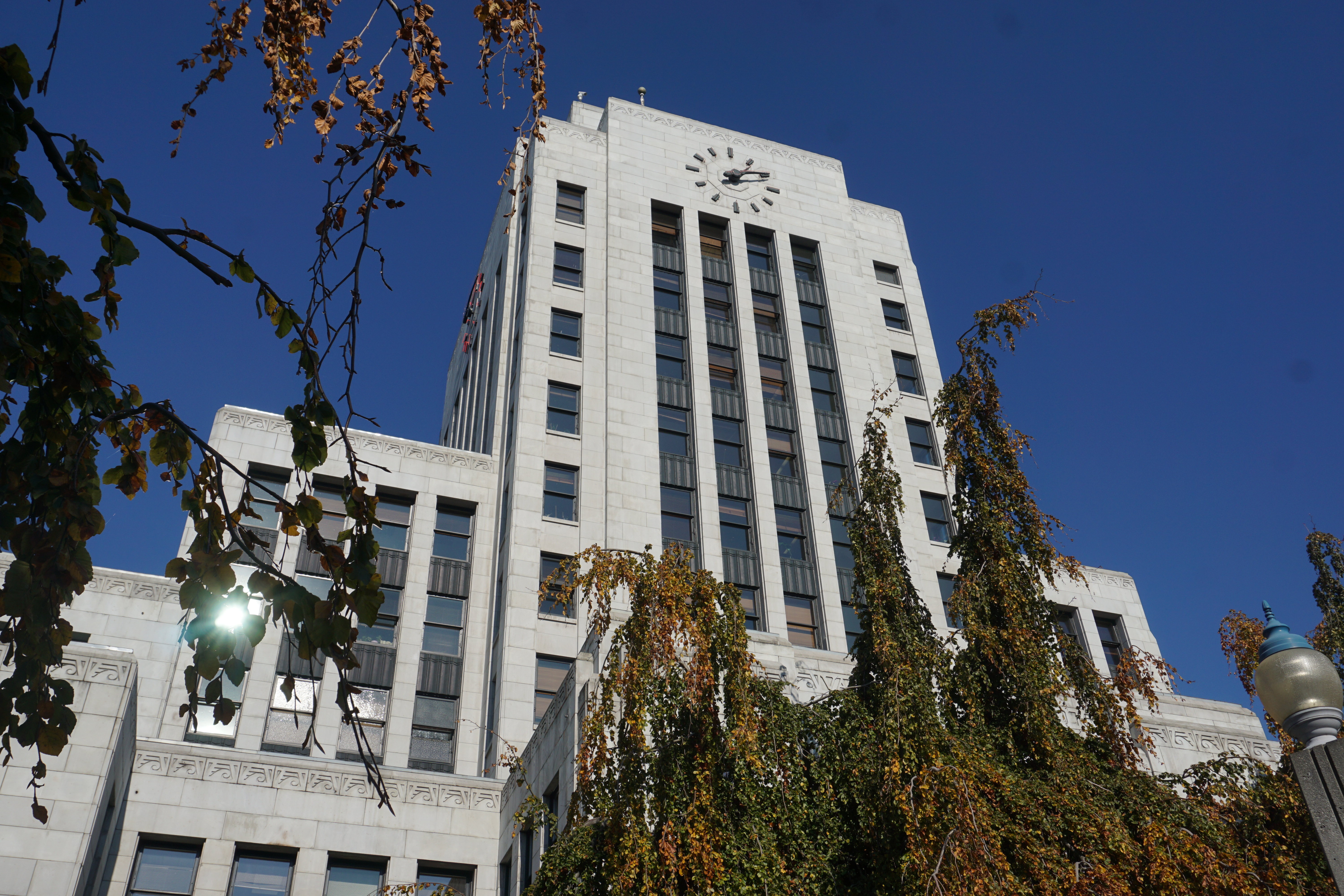
Vancouver city hall (Mackin)
Does Sadhu Johnston stay as city manager?
Gregor Robertson brought Penny Ballem into city hall in 2008 and cast her aside in 2015. Her ex-deputy, Sadhu Johnston, has been city manager for the last three years. It wouldn’t be cheap to dispatch Johnston, who is the top-paid official at $338,000-a-year.
Why did Coalition Vancouver, Vancouver 1st and Yes Vancouver run?
Three parties who were confused about their mission. They seemed to be aiming to defeat the NPA, rather than seeking to win city hall.
Kennedy Stewart had 14,000 more votes than his only viable left-wing challenger, Shauna Sylvester. On the right, Coalition Vancouver’s Wai Young (11,886), Yes Vancouver’s Hector Bremner (9,940) and Vancouver 1st’s Fred Harding (5,645) tallied votes that Sim needed. None of the candidates for Coalition, Yes or 1st were threats for other offices. Bremner was the big loser. He was elected to city council in the 2017 by-election with 13,372 votes. Bremner’s BC Liberal and lobbying baggage, the controversy around the Peter Wall-financed billboards and Facebook group and his car salesman approach to campaigning were the reasons why he failed to win more than 10,000 votes.
The NPA itself can’t escape culpability. If it had a big tent with a solid board and proper marshalling of those inside, it wouldn’t have turned into a circus big top. The 2018 election was its to lose. The first mistake was becoming a place of refuge for out-of-work BC Liberals, like the under-qualified Bremner and his mentor, Mark Marissen, in 2017.
Why was Fred Harding in the race?
The sleeper candidate seemed to be asleep.
Because of his background, ex-senior West Vancouver police officer Fred Harding was best-positioned to make law and order an issue in a city grappling with transnational money laundering and drug gangs that have killed innocents. By way of his position as the face and voice of the force, Harding had the most media training and experience of them all. He has a singer/model wife beloved in the Chinese community and he even vaguely looked like Barack Obama.

Fred Harding (Vancouver 1st)
But he was running for a party that purposely ran candidates in every slot, automatically creating a fundraising nightmare that it tried to solve by spending much of its time marketing to Chinese donors and voters. The party’s signs looked more like a personal injury law firm than a political party.
Without a viable plan or budget, Vancouver 1st only gained mainstream attention by pledging to bring the NBA back to Vancouver and to lure a Major League Baseball franchise. They even suggested building a stadium in South Vancouver. The party that was the voice of community sports and recreation in 2014 jumped the shark in 2018 with a vague plan to house professional sports franchises.
Harding’s biggest mistake was the anti-SOGI video that led to a school board candidate quitting the party.
Will big money be gone next time?
Maybe, maybe not. New parties stood no chance. The NPA had a war chest of at least $830,000 and a brand with history. The Greens, COPE and OneCity benefited from the Vancouver and District Labour endorsement and spending. Will we ever find out how much the unions really spent or just their advertising costs? The NDP left too many loopholes in the campaign finance law and Municipal Affairs Minister Selina Robinson acknowledged the playing field was not level.
Former Vision park board commissioner Sarah Blyth was the top independent for city council, with 29,515. That was more than 14,000 votes below the NPA’s Sarah Kirby-Yung, who claimed the 10th and last seat.
Why so slow to get the results?
At 2:21 p.m. on the afternoon of Oct. 22, NPA leader Ken Sim conceded, congratulated mayor-elect Kennedy Stewart and apologized for the delay. But that’s not the delay we should be wondering about.
Within a half-hour of the polls closing in Toronto on Oct. 22, Mayor John Tory was declared re-elected. In Vancouver on Oct. 20, there was nothing for more than 75 minutes.
There are 1,800 polls in Toronto. The results flowed fast. In Vancouver, it was like molasses.
There were widespread problems with voting machines in Vancouver, chalked up to the length of the ballot. That caused long lineups. Vancouver voting station staff must pack-up and deliver the counting machines to city hall.
Can someone do something about the number of candidates?
Only if the NDP is brave enough to implement a two-step process, like the U.S. A springtime run-off election to cut the field in half would encourage earlier engagement in the process.
The 71 city council candidates and 21 mayoral candidates were too much. Counting school board and park board, there were 158 names on the lengthy ballot. It should also become harder to run, by doubling or even quadrupling the number of endorsement signatures to 100. Voters should be faced with a ballot containing the names of people who want to serve the public for four years, rather than folks who simply want attention during the four-week campaign.
Support theBreaker.news for as low as $2 a month on Patreon. Find out how. Click here.







